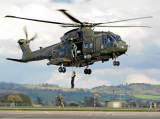
At the NATO summit on Wednesday, G7 members are expected to ratify a long-term security arrangement with Ukraine. The package includes provisions for defense equipment, training, and
intelligence sharing to enhance Ukraine's security.
British Prime Minister Rishi Sunak stated that this agreement would send a strong signal to Russian President Putin. The move comes after Ukrainian President Zelensky criticized NATO's reluctance to provide a timeline for Ukraine's accession to the alliance.
Sunak emphasized that Ukraine's allies are strengthening their formal arrangements to ensure its long-term protection. He expressed the commitment to prevent a repeat of the events that unfolded in Ukraine, highlighting the brutality inflicted by Russia. Supporting Ukraine's pathway to NATO membership and establishing formal bilateral and multilateral agreements will deliver a clear message to the Russian president and help restore peace in Europe, Sunak added.
The United Kingdom played a leading role in this agreement, collaborating with G7 partners Canada, France, Germany, Italy, Japan, and the United States. Further details of the agreement are expected to be unveiled soon.
US President Joe Biden suggested a model for Ukraine similar to the US agreement with Israel, which involves providing $3.8 billion in annual military aid over a decade. However, unlike NATO membership, this agreement does not include a clause to come to the aid of the target nation during an attack.
While NATO stated that Ukraine could join the alliance when certain conditions are met, President Zelensky deemed the delay "absurd." Although Kyiv recognizes that it cannot join NATO while at war with Russia, it aspires to become a member as soon as possible after the conflict ends.
Addressing the public in Lithuania's capital, Zelensky expressed his belief that NATO would provide security for Ukraine and in turn strengthen the alliance. He presented a battle flag from the city of Bakhmut, which witnessed one of the longest and bloodiest battles during Russia's invasion of Ukraine.
The G7 announcement follows NATO's recognition of Ukraine's increasing interoperability with NATO forces and the establishment of the Nato-Ukraine Council, granting Ukraine the right to summon meetings of the entire alliance. However, the lack of a specific timescale is viewed as a setback for Ukraine, as some member states fear that automatic membership could escalate and prolong the war with Russia.
The focus now shifts to the long-term security guarantees that NATO members will offer Ukraine as an alternative to immediate membership. The intention is to provide robust and explicit commitments that deter further aggression from Russia.
In addition to these developments, Turkey has dropped its opposition to Sweden's entry into NATO, and a coalition of 11 nations will begin training Ukrainian pilots to operate US-made F-16 fighter jets. The UK has also announced plans to provide over 70 combat and logistics vehicles to support Ukraine's counteroffensive operation.
Meanwhile, Ukraine's military reported that Russia launched a series of kamikaze drone attacks on Kyiv and its region for a second consecutive night, but there were no immediate reports of casualties or significant damage. Photo by U.S. Department of State from United States, Wikimedia commons.







































